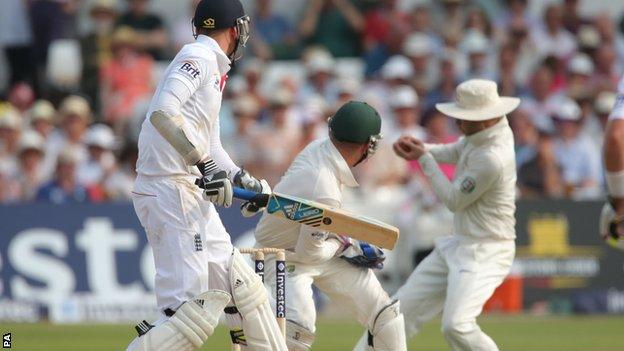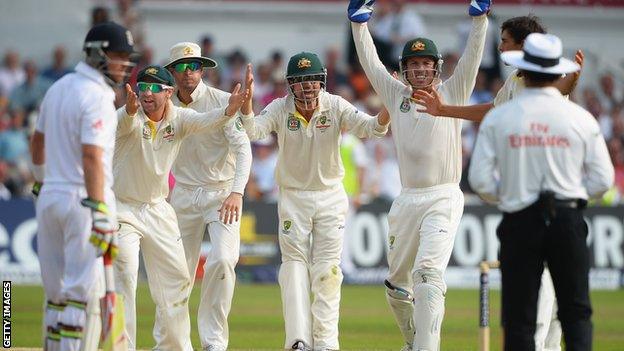Ashes 2013: Jonathan Agnew on Stuart Broad and Aleem Dar
- Published

First things first: Stuart Broad should have walked when he clearly edged Ashton Agar to Michael Clarke at slip.
Some batsmen walk, others don't. Broad should have done.
There are so many strands to what happened, towards the end of another totally enthralling day of Test cricket, as England were finally taking the upper hand in a match that has twisted one way then turned another.
There is nothing within the laws of cricket that says Broad had to depart. But when he chose not to, it became an issue for the spirit of the game.
There is no escaping the scrutiny when you do something like this. Television replays will show everyone around the world exactly what happened.
If you decide to stay, you decide to accept the consequences. You must accept the questions of sportsmanship. You must accept all the abuse that comes your way.
It shouldn't be forgotten that all this would have happened in the briefest of moments. Broad had been batting with resolve and patience, his whole focus on not getting out, on sticking around with Ian Bell to take England from deep trouble towards the sort of lead that their bowlers could attack.

Your mind is full of those things. In that instant, adrenaline running, fielders appealing, something inside of the head can just say: stay.
Then it is too late. Even if you regret it a few seconds later, even if you then change your mind, the die has been cast.
You stay, you get away with it. You might have done your team a favour, but you must then deal with the slating that comes with it.
These sorts of things can scar a player for years to come, change their reputations within the game.
Broad's body language afterwards told you all you needed to know - head bowed, shoulders slumped. He knew he had done the wrong thing.
Now we have the ramifications.
How does it affect the relationship between the teams? Clarke was clearly furious afterwards, while Australia coach Darren Lehmann could not believe what had happened.
What does it mean for Aleem Dar, the three-time ICC umpire of the year? This was an awful decision, one no experienced official should have got wrong.
There are those who say that the Umpire Decision Review System was designed to eliminate howlers like this. Clarke, having used up his second review on a spurious lbw appeal earlier in the day, had none left when the Broad incident happened.
I believe that each team should only have one review per innings. Why? Precisely so you don't use it as Clarke did, as a gamble.
Save it for the blatant mistake. It should not be a tactic but a last resort. We do not want to see reviews used as a speculation.
In so many ways it's a huge shame it had to happen now, in the middle of a wonderful Test match at the start of what should be a brilliant Ashes series.
After the frenetic, breathless action of the first two days, this was something quite different - just as absorbing, but a head-down graft where Wednesday and Thursday had been wild rollercoaster.
Every time England looked settled, looked likely to bat the tourists out of the match, Australia struck. For long parts of the day the tourists appeared to be in the ascendancy.
It was incredibly tense stuff. Only when England's lead edged past 230 did I start to believe they might have enough.
Under most circumstances that would be enough. But this has been such an unpredictable match that you can never quite be sure. Clarke could bat brilliantly. Shane Watson could go out at the top of the order and smash a rapid 70 or 80.
Ian Bell, 95 not out at the close from a partnership of 108 with Broad, deserves enormous credit for the way he took England towards safety.
He batted very well in Auckland over the winter, a real backs-to-the-wall effort, and this was a rather similar innings.
Some people do seem to enjoy having a go at him sometimes. But this was an excellent knock, many hours of relentless graft enlivened with occasional flashes of the old Bell class.
When he bats well, he's the prettiest English batsman of all, all flicks and nudges and glides down to third man.
His long occupation of the crease means all the pressure will now be on the Australian batting as this fine contest moves towards its decisive stages.
From here, England should win.
Jonathan Agnew was talking to BBC Sport's Tom Fordyce
Listen to Jonathan Agnew and Geoffrey Boycott's analysis of each day's play on the Test Match Special podcast.
Pietersen responds to Broad's non-dismissal in Ashes
- Published12 July 2013
- Published12 July 2013
- Published12 July 2013
- Published11 July 2013
- Published10 July 2013
- Published10 July 2013